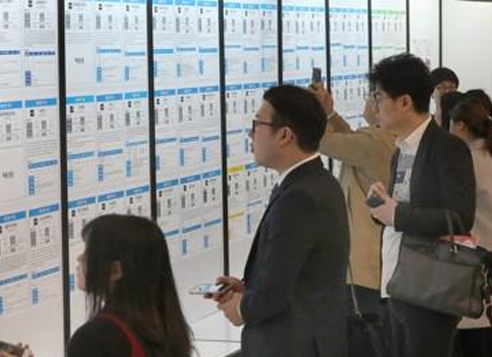SEJONG -- South Korea on Monday outlined an 11.2 trillion-won ($9.99 billion) extra budget plan to create jobs and fuel the recent recovery momentum in the economy.
The supplementary budget -- the first since President Moon Jae-in took office last month -- was approved at a Cabinet meeting.
The budget proposal, just a fraction of the 400 trillion-won state budget for fiscal 2017, is set to be submitted to the National Assembly on Wednesday for approval.
The extra budget is a follow-up to Moon's campaign pledge to put his policy priority on creating jobs, especially for young people.
 |
People seek employment at a job fair in April. (Yonhap) |
Moon promised to create 810,000 public jobs and remove temporary workers from the government agencies and state-run institutions. He also set up a new presidential committee on jobs as his first order after inauguration.
Asia's fourth-largest economy has been experiencing a high jobless rate for the past few years. Its unemployment rate was 3.7 percent in 2016, marking the highest since 2010, with the numbers for those aged between 15 and 29 hitting an all-time high of 9.8 percent.
The latest figures remained worse, as the jobless rate hit a seven-year high of 5 percent in February and reached 4.2 percent in April, the highest rate among all April data in history.
Job conditions for the youth were alarmingly worrisome, and their unemployment rate soared to an all-time high of 12.3 percent in February and stayed above the 11 percent line until April.
"The government drew up the additional budget to tackle the tightened job market for young jobseekers and worsening income disparity," Deputy Finance Minister for budget affairs Park Chun-sup said Friday in a press briefing in Sejong. "Some 110,000 jobs will be created through various programs backed by the supplementary budget.
He said no state bonds will be issued to cover up the extra budget this year. Instead, an excessive 8.8 trillion won in tax revenue will meet most of the outline, with 1.1 trillion won worth of surplus carried over from the last fiscal year.
"Based on the original 2017 budget, the national debt amounts to 680 trillion won and the debt-to-GDP ratio is still high," the official said. "The finance ministry have made efforts to maintain the fiscal soundness and map out the supplementary budget at the same time."
Park also added that the economy, which is showing clear signs of recovery, will be boosted by the fiscal injection, saying, "The additional government spending is expected to push up the growth rate by 0.2 percentage point this year."
South Korea's gross domestic product expanded 1.1 percent in the January-March period from the previous quarter, marking a slight increase from an earlier estimate of a 0.9 percent expansion in late April.
Brisk exports lent support to the upturn in the economy, with outbound shipments gaining ground for seven straight months since November last year.
The government and the central bank earlier forecast that the South Korean economy will expand 2.6 percent in 2017, but many expected that they will soon revise up the growth outlook, citing such better-than-expected economic data.
According to the finance ministry, the proposed 11.2 trillion-won extra budget showed that 4.2 trillion won will be poured to create jobs and 1.2 trillion won and 2.3 trillion won will be used to improve working conditions and stabilize the livelihoods of ordinary people, respectively. The remaining 3.5 trillion won will be given to provincial governments.
As part of the job-creation programs, the government will hire 12,000 more civil servants in the security and welfare sectors, including firefighters, police officers and teachers. Some 24,000 jobs at social welfare services, such as child care teachers, will be newly created, with 30,000 seniors to be employed as babysitters, part-time assistant teachers, caretakers and nurses.
As a way to encourage young talented jobseekers to work at small and mid-sized enterprises, the government will help 60,000 of them save 16 million won each after two full years in a company.
The government will create a number of funds worth more than a combined 1.5 trillion won to help young business people establish startup companies and make a comeback after failure.
The 1.2 trillion-won package to enhance the workplace environment includes a plan to increase the subsidy for child care leave to 80 percent of the ordinary wage from the current 40 percent, with the number of public child care centers doubling to 360.
Also, 2.3 trillion won will be spent to ease the financial burden of ordinary people. By the end of the year, 252 dementia care centers will be established nationwide, while 2,700 residents will be offered to youth at a lower rent. (Yonhap)


![[Herald Interview] 'Korea, don't repeat Hong Kong's mistakes on foreign caregivers'](http://res.heraldm.com/phpwas/restmb_idxmake.php?idx=644&simg=/content/image/2024/11/13/20241113050481_0.jpg)
![[KH Explains] Why Yoon golfing is so controversial](http://res.heraldm.com/phpwas/restmb_idxmake.php?idx=644&simg=/content/image/2024/11/13/20241113050608_0.jpg)




